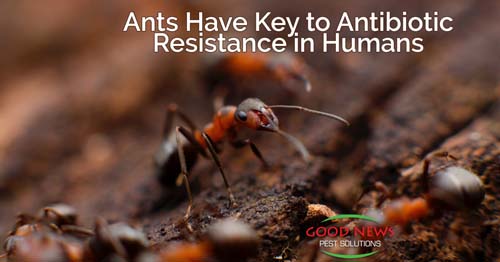
Ants: The Key to Antibiotic Resistance in Humans?
Since the discovery of penicillin in 1928, antibiotics have become a life-saving force in the world. Primarily used for treating infections, antibiotics are now an essential part of everyday life for medical professionals.
Without antibiotics, we couldn’t safely transplant organs, implant artificial hearts, hips and knees, do kidney dialysis..no more liposuction— or most other cosmetic surgeries.
Any type of invasive surgery would be off the table. Even giving birth or catching a head cold would become exceedingly more dangerous. And that’s just looking at medicine. Our food supply — animal and plant— is also largely dependent on antibiotics.
Resistance is Futile
Unfortunately, it didn’t take long for bacteria to start adapting once we started mass producing and utilizing antibiotics. By the end of World War II, new strains of the most common bacterials started developing. MRSA was discovered in 1961 and is now considered common in most hospitals.
But 1996 marked the biggest change yet. A strain of Staph was discovered in Japan that was resistant to almost every antibiotic developed to that point. It was succeeded by VRSA a few years later. Now, scientists with the World Health Organization list more than a dozen antibiotic resistant bacterium, commonly termed “Superbugs.”
And even more disconcerting, even normal bacterial strains are getting better at resisting antibiotics. Researchers are hesitant to set a date, but some predict that without a radical shift, antibiotics could be rendered almost entirely ineffective within a generation or two.
Look to the Ant
But there is Good News…
Recently scientists at Arizona State University had a break through. Studying the activity of 20 species of ants, the scientists discovered that many species produced natural antimicrobial chemicals. They utilize these secretions in their cleaning and grooming rituals, thereby protecting the colony from infection.
They discovered that 60% of the ants they studied produced these natural disease fighting substances. The other 40% did not. But many still resisted the bacterial infections they were exposed to. The researchers believe more study is warranted to discover how those ants protect themselves.
Understanding how the ants protect themselves, through secretions or other means, could hold the key to solving antibacterial resistance for us as well.
Natural Ant-swers
The researchers at ASU pointed out that the grooming techniques of the ants are one of the reasons they have appeared to build up resistance to insecticides and other chemicals. The good thing about Good News Pest Solutions? We use 100% organic, risk-reduced treatments to control ant populations outside your home and keep them from coming in. We don’t mind learning from them, just not in our kitchens and bedrooms.
If you’d like to learn more about our comprehensive Perimeter Plus Green Pest Control Solutions that have kept our customers from Parrish to North Port safe and pest-free, just give us a call!
« Back to BlogProudly Serving
Sun City Center, Ruskin, Palmetto, Parrish, Ellenton, Bradenton, Anna Maria, Holmes Beach, Bradenton Beach, Longboat Key, Lakewood Ranch, University Park, Myakka City, Sarasota, Siesta Key, Osprey, Nokomis, Casey Key, Venice, Englewood, North Port, Port Charlotte, Punta Gorda, Arcadia
Things You Can Do
Pay Your Bill Online
Leave Us a Review
Request a Free* Termite Inspection
Stop Mosquito Bites
Get Rid of Rodents
Get a Termite Damage Warranty
Get Pest Control for Your Attic
Get Pest Control for Your Business Request Prayer
Corporate Address
1080 Enterprise Court, Ste A
North Venice, FL 34275
Call Now: (941) 412-9610
Text: (941) 412-9610
Fax: (941) 412-0080
